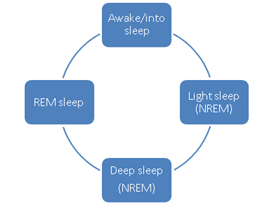
Help support good sleep for emotional regulation and mental health
Help support good sleep for emotional regulation and mental health

It’s important, now more than ever, to take care of our emotional wellbeing. Healthy sleep routines, developing new techniques in regulating emotions and supporting mental health are all great ways of facilitating a positive wellbeing.
Why is sleep important?
Sleep plays a key role in supporting good health; both physically and mentally.
When we sleep, the body works hard to support tissue repair, releasing hormones for supporting growth and maintaining healthy brain function. Without good sleep it can be hard to concentrate, be mentally aware and regulate emotions.
For lots of people with neurodiverse conditions, they may find their symptoms become more prominent when they don’t get enough quality sleep that their brain and body needs.
What are the stages of sleep?
When we sleep our body cycles several times through four different sleep stages:
During these sleep stages, there are two types of sleep, known as Rapid Eye Movement (REM) and non–Rapid Eye Movement (NREM). During a typical night, you will move between these two types of sleep, with deeper periods of REM sleep happening as we enter morning. This can be when we have most of our vivid dreams.
Stage 1—Awake/into sleep:The first stage of non-REM sleep often takes several minutes to experience as we move from being awake to asleep. It is at this stage that our breathing, heart rate and eye movements all begin to slow down.
Stage 2—Light sleep NREM: This second stage is where you will experience a period of light seep before you start moving into a deeper sleep. It’s at this stage where there’s an increase in electrical activity and you might experience physical jerks. During this stage, your breathing will slow alongside your heart rate and your temperature drops. This is also when your eye movement will stop.
Stage 3—Deep sleep: This is the vital stage of sleep which helps us to feel well rested when we wake. During this stage, heart rate and heartbeat will slow right down to the lowest level in the sleep cycle. It’s at this point during sleep that it can be difficult to wake you up.
Stage 4—REM sleep: This fourth stage of sleep is where your eye lids will be closed but your eyes will be moving side to side in a quick motion. Your heart rate and blood pressure will raise, and your breathing will become faster. As this is the stage where most of your dreaming happens, the body will become temporarily paralysed to stop you from trying to perform your dreams.
Top tips for forming a positive sleep routine
When thinking about implementing a positive sleep routine there are some key ideas you might want to try:
- 2 hours before bed: Turn any electronics off that might be omitting a blue light. You might want to substitute this with calming music.
- Get the temperature right: Research suggests that for us to get the body ready for sleep the room temperature should be at 19 ºC. A bath might be helpful as part of a sleep routine. If your child experiences sensory differences, you might want to keep pyjamas warm on the radiator or in the tumble drier before they put them on.
- Sleepy foods: Diet plays a key role in sleep. It’s always a good idea to reduce sugary food and caffeine products before bed. There are some foods that help increase melatonin. These are foods that contain tryptophan. Examples of these foods include oats, cereals, cherries, bananas, yoghurt, and milk. Research suggests these foods are best eaten 1 hour before sleep.
- Relaxation time: Fine motor skill activities can be really helpful to calm the brain before bedtime. These activities are small movement activities like building with blocks, colouring-in/drawing, playdough, and kinetic sand. For lots of children, it’s also important to develop skills in emotion regulation. Techniques such as square breathing and mindfulness can help at different points throughout the day. They are also particularly useful before bedtime, as children can become emotionally dysregulated at the end of a busy day.
- Square breathing: Ask your child to draw a square in the air with their finger. Practice drawing the square in the air a couple of Once established, introduce your child to breathing whilst continuing to draw the square. Follow the formula .
- Objects of reference: For lots of children, bedtime can feel like a daunting part of the day. This is often the time that they are alone. Displaying pictures of you next to your child’s bed might help to settle them when they’re on their own. You might also want to encourage them to have something that reminds them of you in bed with them. Examples of these could be t-shirts, teddy bears, objects that smell of your perfume/aftershave.
How much sleep do you need?
The amount of sleep someone needs depends on the individual however, age does play a role in the number of hours sleep a person needs.
Babies have the most amount of sleep, sleeping on average between 16 to 18 hours per day. This is because babies are going through a period of significant growth and need lots of sleep to support this development.
For school-aged children and teenagers, they can sleep for an average of 9.5 hours each night, and when you move into adulthood you are likely to require between 7-9 hours.
After the age of 60, sleep quality can reduce, leading to increased periods of waking through the night.
Melatonin and your circadian rhythm
Melatonin is a hormone that your body produces to promote sleep. Often people with neurodiverse conditions experience reduced levels of melatonin and may need support.
The circadian rhythm is your body’s 24-hour clock that responds to light and dark. It helps you to manage the flow of the day. How often do you find you get hungry or tired around the same time each day? That’s your circadian rhythm prompting you for flow and routine of the day.
Consistent sleep routines help to support your circadian rhythm. For children with neurodevelopmental conditions, circadian rhythms can sometimes be misaligned, meaning getting a positive sleep routine in place is really important.
Recent research has found that exposure to blue light can reduce the production of melatonin and have an effect on our circadian rhythm. Blue light can be found in many of the common electronics we find around the home; tablets, mobile phones, computers, TV screens.
Top tip: Reduce or completely cut out exposure to blue light at least two hours before sleep.
Written by: Emma Weaver, Director of Early Years & Assistant Director of Training at a Neurodiversity Charity





